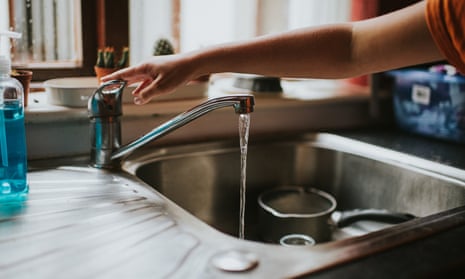Water in Dubbo and surrounding towns has been undrinkable for nearly a week as local authorities work to “climate-proof” against the future contamination of catchments.
After the Little River swelled during the deluge of rain, animal faeces and carcasses were flushed into the catchment.
Dubbo, a city of more than 43,000 people in the central west of New South Wales, was one of a number of regions that have confronted a jeopardised water supply over the past few years due to fires, storms, floods and drought.
The mayor of Dubbo regional council, Mathew Dickerson, said it showed there was a need to make water supplies more resilient to climate change.
“As we get to those extremes with drought and flood or rain, I think we will see more resilience need to be built into water treatment plants across the state, because this is relative to our life going forward,” he said.
“So we’ve got to work out going forward how many times it’s going to happen again, and how we can get that water treatment process to a level that it can be more resilient.”
The council issued a boil-water alert last Wednesday after flooding caused the water supply quality to exceed safe drinking levels. Dickerson said they hoped to finish draining the turbid water from the three main reservoirs on Thursday.
Jordan Morrow, a childcare worker at Playmates Cottage childcare centre, said the council had been delivering bottled water to the centre every morning since the alert was put in place. “Thankfully, we don’t have to boil water for 52 children a day,” he said.
Dubbo residents told the Guardian that bottled water had become hard to get in supermarkets as people stocked up.
Prof Stuart Khan, a water expert at the University of New South Wales, said climate change posed an increasing challenge to reliable drinking water supply across the country.
In Bermagui, on the NSW south coast, the Black Summer bushfires put the quality of their water supply beyond safe drinking levels. In response to this, a new water filtration plant is being built to make the system more resilient.
In June 2021, after severe storms hit Victoria, Yarra Valley Water issued a warning for some areas to not drink the tap water even if it was boiled.
For the towns that almost ran out of water during the drought in 2019, Khan said a number of councils tapped into groundwater as an emergency solution.
Dubbo has been expanding the number of bores to make the region more drought and flood resilient, but Dickerson said this backup source couldn’t be used during the current crisis due to low water supply.
According to Khan, coastal cities were better at adapting to water supply issues as they have a number of sources to draw from, whereas regional and rural areas often only have one supply.
In Sydney, the Orchard Hills Water Filtration Plant was struggling to produce water after recent flooding, and suburbs serviced by the plant were asked to conserve drinking water. But the pressure on water supply was relieved by the ramping up of Sydney’s seawater desalination plant.
“In NSW, outside of Sydney and the Hunter, drinking water supplies are managed by local government, and local government is notoriously under-resourced and struggle to make major investments,” Khan said.
The director of the City Powers Partnership, Portia Odell, said part of the issue was a lack scientific modelling of local climate impacts to inform councils as they plan to adapt.
Khan said in responding to the gaps the federal government’s election promise to renew the National Water Initiative should include a strategy for improving resilience to climate change for drinking water systems, and that state governments need to provide more funding and expertise to support adaptation.
“It should be a top-down approach that should be a clearly laid out strategy, rather than an ad hoc ‘Here’s a crisis, here’s a problem, let’s put a Band-Aid on that,” he said. “We really need to address it more fundamentally.”
Khan said when it comes to drought “we tend to have a short memory in that we wait until we’re in a crisis”.
“We will recognise what the problem is and we will say how this needs to be done better. And then the rain comes along, and the dams fill up and the pressure goes away. And we tend to move on to higher priorities, which may be another crisis such as a flood.”
In the NSW government’s 2022-2023 budget, $369.6m was flagged under the safe and secure water program for communities in regional and remote NSW to improve water security.
Under the program, 26 projects had been completed since 2017, with another 200 under way.
